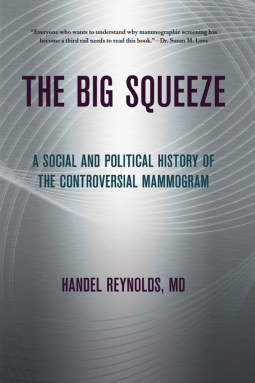
The Big Squeeze
A Social and Political History of the Controversial Mammogram
by Dr. Handel Reynolds; Handel E. Reynolds
This title was previously available on NetGalley and is now archived.
Send NetGalley books directly to your Kindle or Kindle app
1
To read on a Kindle or Kindle app, please add kindle@netgalley.com as an approved email address to receive files in your Amazon account. Click here for step-by-step instructions.
2
Also find your Kindle email address within your Amazon account, and enter it here.
Pub Date Jul 12 2012 | Archive Date Sep 01 2012
Cornell University Press | ILR Press
Description
In 2009, an influential panel of medical experts ignited a controversy when they recommended that most women should not begin routine mammograms to screen for breast cancer until the age of fifty, reversing guidelines they had issued just seven years before when they recommended forty as the optimal age to start getting mammograms. While some praised the new recommendation as sensible given the smaller benefit women under fifty derive from mammography, many women's groups, health care advocates, and individual women saw the guidelines as privileging financial considerations over women's health and a setback to decades-long efforts to reduce the mortality rate of breast cancer.
In The Big Squeeze, Dr. Handel Reynolds, a practicing radiologist, notes that this episode was only the most recent controversy in the turbulent history of mammography since its introduction in the early 1970s. In a book written for the millions of women who face the decision about whether to get a mammogram, health professionals interested in cancer screening, and public health policymakers, Reynolds shows how pivotal decisions made during mammography’s initial launch made it all but inevitable that the test would be contentious. He describes how, at several key points in its history, the emphasis on mammography screening as a fundamental aspect of women’s preventive health care coincided with social and political developments, from the women’s movement in the early 1970s to breast cancer activism in the 1980s and ’90s.
At the same time, aggressive promotion of mammography made the screening tool the cornerstone of a huge new industry. Taking a balanced approach to this much-disputed issue, Reynolds addresses both the benefits and risks of mammography, charting debates, for example, that have weighed the early detection of aggressively malignant tumors against unnecessary treatments resulting from the identification of slow-growing and non-life-threatening cancers. The Big Squeeze, ultimately, helps to evaluate the ongoing public health controversies surrounding mammography and provides a clear understanding of how mammography achieved its current primacy in cancer screening.
Advance Praise
“The Big Squeeze is first class. Dr. Handel Reynolds describes the controversy over mammography in a careful, objective fashion. He avoids polemical descriptions and shares with readers the information currently available about the benefits and risks of mammography.”—Jerome Kassirer, MD, Distinguished Professor, Tufts University School of Medicine, author of On the Take: How Medicine’s Complicity with Big Business Can Endanger Your Health
“The Big Squeeze is a terrific book: a history of screening mammography that is interesting, important, timely and controversial. The book is short, fast moving, and balanced (although, in this day of polarized opinions, balance is often perceived only through the eyes of the beholder). It will be of particular interest to women, physicians, and perhaps politicians. Dr. Handel Reynolds interweaves scientific, social, political, emotional and economic issues, many of which are peculiar to breast cancer. Much of the confusion and controversy regarding screening mammography resolves around age and timing: when to begin and how often. Physicians, statisticians, politicians, and patients from around the world, each using the same data, have come up with different recommendations for breast screening. Dr. Reynolds takes us on this roller-coaster ride and his conclusions are that annual screening mammography, starting at age 40, does save lives, but . . .”—Ferris M. Hall, MD, FACR, Beth Israel Deaconess Medical Center and Harvard Medical School
"The Big Squeeze is a fascinating and thought-provoking review of the history, science, and politics of breast cancer screening. Despite my many years in this field, I learned a great deal, particularly about some of the earlier years of the development of screening mammography. The book is beautifully written and highly readable—it will be a great resource for health care professionals and the public."—Valerie P. Jackson, MD, FACR, Eugene C. Klatte Professor and Chair, Department of Radiology and Imaging Sciences, Indiana University School of Medicine
Available Editions
| EDITION | Other Format |
| ISBN | 9780801450938 |
| PRICE | $19.95 (USD) |
| PAGES | 136 |



